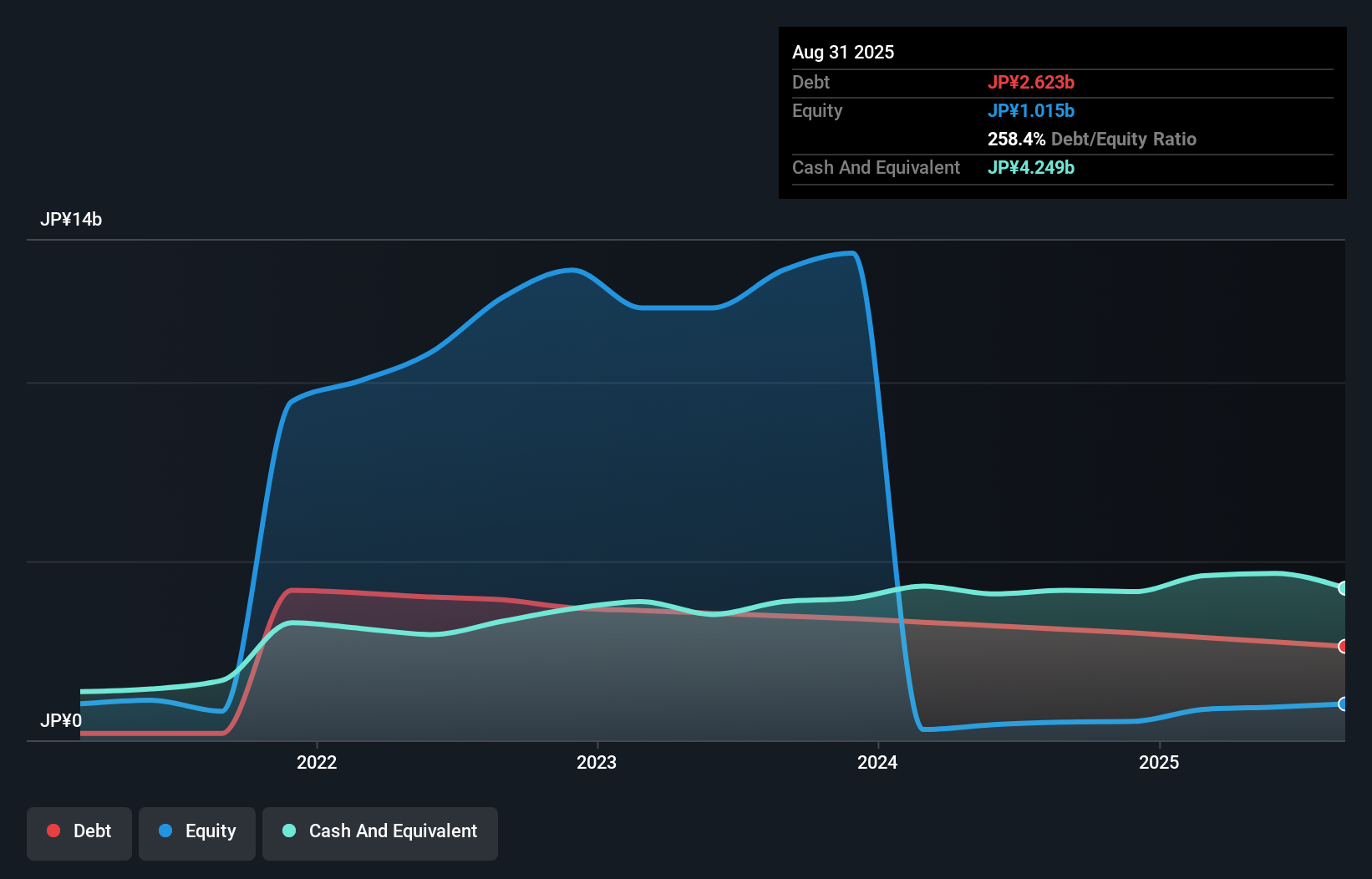Some say volatility, rather than debt, is the best way to think about risk as an investor, but Warren Buffett famously said that 'Volatility is far from synonymous with risk.' So it seems the smart money knows that debt - which is usually involved in bankruptcies - is a very important factor, when you assess how risky a company is. We note that VisasQ Inc. (TSE:4490) does have debt on its balance sheet. But should shareholders be worried about its use of debt?
What Risk Does Debt Bring?
Debt assists a business until the business has trouble paying it off, either with new capital or with free cash flow. In the worst case scenario, a company can go bankrupt if it cannot pay its creditors. However, a more frequent (but still costly) occurrence is where a company must issue shares at bargain-basement prices, permanently diluting shareholders, just to shore up its balance sheet. Having said that, the most common situation is where a company manages its debt reasonably well - and to its own advantage. The first thing to do when considering how much debt a business uses is to look at its cash and debt together.
How Much Debt Does VisasQ Carry?
You can click the graphic below for the historical numbers, but it shows that VisasQ had JP¥2.62b of debt in August 2025, down from JP¥3.10b, one year before. However, it does have JP¥4.25b in cash offsetting this, leading to net cash of JP¥1.63b.

How Healthy Is VisasQ's Balance Sheet?
The latest balance sheet data shows that VisasQ had liabilities of JP¥5.59b due within a year, and liabilities of JP¥116.0m falling due after that. On the other hand, it had cash of JP¥4.25b and JP¥1.75b worth of receivables due within a year. So it can boast JP¥295.0m more liquid assets than total liabilities.
This short term liquidity is a sign that VisasQ could probably pay off its debt with ease, as its balance sheet is far from stretched. Simply put, the fact that VisasQ has more cash than debt is arguably a good indication that it can manage its debt safely.
View our latest analysis for VisasQ
On top of that, VisasQ grew its EBIT by 75% over the last twelve months, and that growth will make it easier to handle its debt. When analysing debt levels, the balance sheet is the obvious place to start. But it is VisasQ's earnings that will influence how the balance sheet holds up in the future. So when considering debt, it's definitely worth looking at the earnings trend. Click here for an interactive snapshot.
Finally, a company can only pay off debt with cold hard cash, not accounting profits. VisasQ may have net cash on the balance sheet, but it is still interesting to look at how well the business converts its earnings before interest and tax (EBIT) to free cash flow, because that will influence both its need for, and its capacity to manage debt. During the last two years, VisasQ produced sturdy free cash flow equating to 68% of its EBIT, about what we'd expect. This cold hard cash means it can reduce its debt when it wants to.
Summing Up
While we empathize with investors who find debt concerning, you should keep in mind that VisasQ has net cash of JP¥1.63b, as well as more liquid assets than liabilities. And we liked the look of last year's 75% year-on-year EBIT growth. So we don't think VisasQ's use of debt is risky. The balance sheet is clearly the area to focus on when you are analysing debt. But ultimately, every company can contain risks that exist outside of the balance sheet. To that end, you should be aware of the 2 warning signs we've spotted with VisasQ .
If, after all that, you're more interested in a fast growing company with a rock-solid balance sheet, then check out our list of net cash growth stocks without delay.
New: Manage All Your Stock Portfolios in One Place
We've created the ultimate portfolio companion for stock investors, and it's free.
• Connect an unlimited number of Portfolios and see your total in one currency
• Be alerted to new Warning Signs or Risks via email or mobile
• Track the Fair Value of your stocks
Have feedback on this article? Concerned about the content? Get in touch with us directly. Alternatively, email editorial-team (at) simplywallst.com.
This article by Simply Wall St is general in nature. We provide commentary based on historical data and analyst forecasts only using an unbiased methodology and our articles are not intended to be financial advice. It does not constitute a recommendation to buy or sell any stock, and does not take account of your objectives, or your financial situation. We aim to bring you long-term focused analysis driven by fundamental data. Note that our analysis may not factor in the latest price-sensitive company announcements or qualitative material. Simply Wall St has no position in any stocks mentioned.
About TSE:4490
VisasQ
Provides knowledge sharing platform/consulting services for business and organizational development in Japan.
Excellent balance sheet and fair value.
Market Insights
Community Narratives



